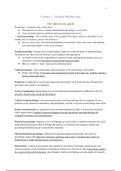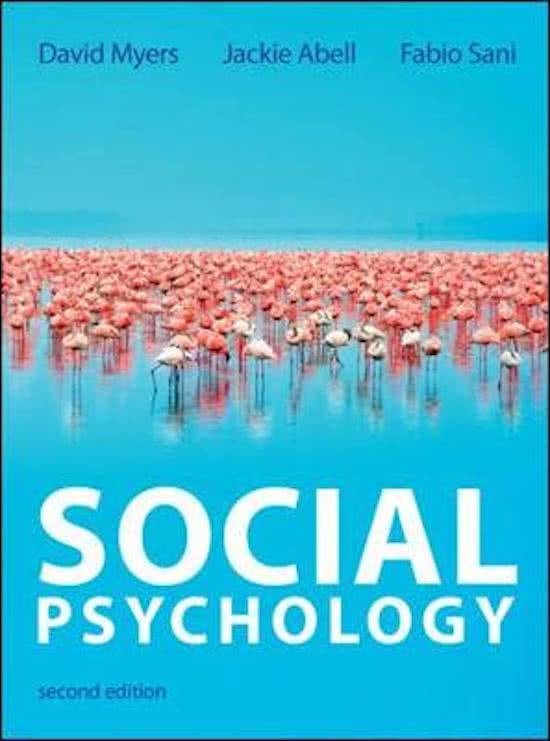1
Lecture 1 - General Introduction
Ch1: intro to soc. psych
Psychology = scientific study of the mind
● The behavior you show is mostly determined by the things in your mind
● Goal: formulate general statements about psychological processes.
→ Social psychology = the scientific study of how people thinkabout, influence, and relate to one
another (social relations, groups and identities)
● between skins issues: the relational dimension of social life, within skins issues: the thinking
and experiential aspect of our social existence
Gestalt psychology:German school of psychology, stands for a holistic theory of mind and brain,
focusing on how these actively structure our perceptions and impressions.
● one needs to look at the comprehensive situation to fully understand the human conscious
experience, asserting 'the whole is more that the sum of its parts'
● Bike as a whole is “more” than just the individual parts
Volkerpsychologie: ‘mass’ psychology, folk psychology or the psychology of the people
● People who belong tothe same social groups tend to think in the same way, holding collective
beliefs, norms and values
Positivism: an approach to science that claims true knowledge can be achieved only through sense
perception and empirical investigation
Levels of explanation: human behaviour can be understood and interpreted at different levels: the
personal, interpersonal, group and ideological
Critical social psychology: a movement promoting a social psychology that i) recognizes its own
political, social, historical situatedness, and participants, and that ii) pursues social change and reform
Social constructionism: an approach to how our understanding of reality is formed and structured,
which argues that all cognitive functions originate in social interaction, and must therefore be
explained as product of social interactions
Discursive psychology: proposes a view of language as 'social action' as speakers construct the social
world and their position within it through talk and text. It examines how cognitive entities and
psychological phenomena are constructed in discourse
Phenomenological psychology: influenced by phenomenological philosophy, this forms of
psychology argues that subjective conscious experience and a sense of 'being-in-the-world' are
fundamental in understanding human social behaviour
Behaviorism: a school of psychology that emphasizes the effects of learning, reinforcement and
situational factors on the facilitation or inhibition of behaviour. The theory claims psychology should
be a study of observable behaviour, since thoughts, motives and feelings are unavailable for research.
, 2
Social representations: socially shared beliefs, including our own assumptions and cultural ideologies
People are influenced by 2 different types of others: a) actual (explicit), b) imagine(implicit) (e.g. its
your mom’s bday today so you have her in mind and she influences your behavior)
What is social psychology studying?: Social thinking,Social influence,Social relations, Groups and
identities
Perspectives on social psychology:
1. Social cognitive
● theoretical perspective focused onmentalprocesses: attention, interpretation and
memory of social experiences
○ (e.g. pictures that are displayed and you can see two things but it depends the
perspective how you see it (it depends where you focus your attention on, it
depends what you're gonna see)) what you’re gonna see depends on your
emotions right now
2. E
volutionary
● the theoretical perspective that explains social behavior from physical and
psychological characteristics that are adapted over the centuries to improve the
chances of survival and reproduction
● natural selection: the process in which important features that are beneficial for
survival are passed onto offspring
○ Wild Guppies(small fishes) study: predator ponds - guppies develop
camouflage and guppies reproduce at a really young age; the ones without
predators didn’t have to worry and male guppies developed bright colors to
attract females because the second biggest concern is reproduction)
→ old, but testable. Explains why some forms of human behaviour are
universal
3. Social Learning
● theoretical perspective that uses learning experiences in the past as predictors for
future behaviour
○ it is learned best by imitation
4. Socio-cultural
● Tgeoretical perspective that looks for causes of social behaviour
● Why are soft drugs permitted in the Netherlands, why are some men allowed to have multiple
of wifes?
● One perspective is not more “true” than the other
, 3
Ch2: research methods in social psych
Hindsight bias: the tendency to exaggerate, after learning an outcome, one's ability to have foreseen
how something turned out. Also known as the 'knew-it-all-along' effect
● Fraud
● Replication crisis
Researchquestion:a question to be addressed by research
Theory:a set of related assumptions and predictions intended to explain a particular aspect of the
world
Hypothesis: a testable proposition that describes a relationship that may exist between variables -
based on a theory
Study:test of the hypothesis
● Qualitative: approach to researched based on the interpretation of qualitative data, not
statistical analysis and numerical data (interview)
● Quantitative research: approach to research aimed at studying the relationships between
variables. Variables are expressed numerically, and their relationships are explored via
statistical analysis.
○ Correlational research- examines the naturally occurring relationship between
variables, without affecting any of the variables
■ correlation: a score between -1 and 1 (very hard to find)
○ Experimental research - studies that seek to understand cause-effect relationships by
manipulating one or more factors (IV) while controlling others (holding them
constant)
■ advantage: you can make statements about causality
■ independent variable (manipulated) and dependent variable (measured)
● Ethics
○ informed consent
○ avoid deception
○ protect participants from harm and discomfort
○ confidentiality
○ debriefing
reflexivity: to recognize the role of the researcher in the production of the research findings
method of constant comparison: a technique whereby the researcher compares categories of
responses to establish similarities and differences in meaning
, 4
Lecture 2 - Explaining Behaviour of Ourselves
Ch3: the self
divided based on the textbook structure, includes info from lecture too
Generation Z → “the generation of selfie”
SPOTLIGHTS AND ILLUSION
Spotlight effect:the belief that other are paying more attention to one's appearance and behaviour
than they really are
Illusion of transparency: the illusion that our concealed emotions leak out and can be easily read by
others
WHO AM I?
Self-concept: a person's answers to the question 'Who am I?'
Self-schemas: beliefs about self that organize and guide the processing of self-relevant information
Schemas: mental templates by which we organize our world
Self reference effect:the tendency to process efficiently and remember well information related to
oneself.
Cocktail-party effect: the brain's ability to focus one's auditory attention (an effect of selective
attention in the brain) on a particular stimulus while filtering out a range of other stimuli, as when a
partygoer can focus on a single conversation in a noisy room
Personal identity: how you think about your unique personality and qualities
Social identity:how you feel about your identity as member of certain groups
Relational identity: how you think about yourself in relation to others
Working self-concept:self-concept in a specific context
Distinctiveness hypothesis: w
e stress what makes us unique in a specific context
Possible selves: images of what we dream of or dread becoming in the future
Self-discrepancy theory
- the discrepancy between the actual and the ideal selfleads to dejection-related emotions
(disappointment, dissatisfaction, sadness and that a
- discrepancy between the actual and ought selfgenerates agitation-related emotions (fear,
threat, restlessness)
1. The actualself
2. The idealself
- striving for goals that are a part of our ideal self is not as effortful as striving for
ought self
3. The oughtself: attributes that people believe they have a responsibility to possess (what we
should be)






